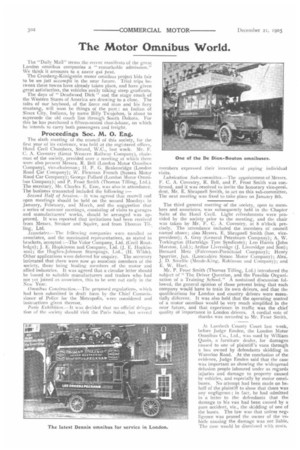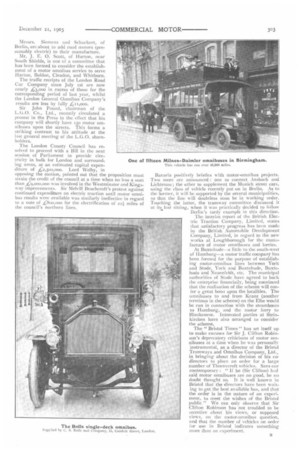The Motor Omnibus World.
Page 2

Page 3

If you've noticed an error in this article please click here to report it so we can fix it.
The "Daily Mail" terms the recent manifesto of the great London omnibus companies a "remarkable admission." We think it amounts to a sauve qui peul. The Cronherg-Konigstein motor omnibus project bids fair to be un fait accompli in the near future. Trial trips between these towns have already taken place, and have given great satisfaction, the vehicles easily taking steep gradients. The days of " Deadwood Dick " and. the stage coach of the Western States of America are drawing to a close.. The tales of our boyhood, of the fierce red man and his fiery mustang, will soon be things of the past : an Indian of Sioux City, Indiana, by name Billy Twojohns, is about to supersede the old coach line through South Dakota. For this he has purchased a fifteen-seated char-A-banc, on which he intends to carry both passengers and freight.
Proceedings Soc. M. 0. Eng.
The sixth meeting of the council of this society, for the first year of its existence, was held at the registered offices, Hotel Cecil Chambers, Strand, W.C., last week. Mr. F. C. A. Coventry (Great Western Railway Company), chairman of the society, presided over a meeting at which there were also present Messrs. R. Bell (London Motor Omnibus Company), vice-chairman; II. P. G. Brakenridge (London Road Car Company); W. Flexman French (Sussex Motor Road Car Company); George Pollard (London Motor Omnibus Company); and P. Frost Smith (Thomas Tilling, Ltd.). The secretary, Mr. Charles E. Esse, was also in attendance. The business transacted included the following :— Second Half of Session.—It was agreed that council and open meetings should be held on the second Mondays in January, February, and March, and the suggestion that a series of summer meetings, consisting of visits to garages and manufacturers' works, should be arranged was approved. It was reported that invitations had been received from Messrs. Straker and Squire, and from Thomas Tilling, Ltd.
Associates.—Tim following companies were enrolled as associates, and the nominated representatives, as stated in brackets, accepted :—The Valor Company, Ltd. (Cecil Routledge); J. E. Hopkinson and Company, Ltd. (J. E. Hopkinson); the Hughes-Johnson Stampings, Ltd., (H. Wilde). Other applications were deferred for enquiry. The secretary intimated that there were now 40 associate members of the society, these being leading members of the motor and allied industries. It was agreed that a circular letter should be issued to suitable manufacturers and traders who had not yet joined as associates, this to be sent out early in the New Year.
Omnibus Const.ruction.—The proposed regulations, w hid] had been submitted in draft form by the Chief Commissioner of Police for the Metropolis, were considered and instructions given thereon. Paris Exhibition.—It was decided that no official delegation of the society should visit the Paris Salon, hut several
members expressed their intention of paying individual visits.
Lubrication Sub-commitlec.—The appointment of Messrs. F. C, A. Coventry, R. Bell, and P. Frost Smith was confirmed, and it was resolved to invite the honorary vice-president, Mr. E. Shrapnell Smith, to act on this sub-committee. The next meeting was fixed to take place on January 8th.
The third general meeting of the society, open to members and associates, was subsequently held in the Chapter Suite of the Hotel Cecil. Light refreshments were provided by the society prior to the meeting, and the chair was taken by Mr. F. C. A. Coventry, at 8 o'clock precisely: The attendance included the members of council named above; also Messrs. E. Shrapnel! Smith (lion. vicepresident); A. Grey (General Petroleum Company); A. W. Torkington (Hartridge Tyre Syndicate); Leo Harris (John Marston, Ltd.); Arthur Liversidge (J. Liversidge and Son); Bernard Metz (Falconnet-Perodeaed Company); Henry Spurrier, Jun. (Lancashire Steam Motor Company); Alex. J. D. Sinellie (Meade-King, Robinson and Company); and E. W. Hart.
Mr. P. Frost Smith (Thomas Tilling, Ltd.) introduced the subject of "The Driver Question, and the Possible Organisation of a Training School." A sustained discussion followed, the general opinion of those present being that each company would have to train its own drivers, and that the qualifications for London and country drivers were essentially different. It was also held that the operating control of a motor omnibus would be very much simplified in the near future, and that experience in traffic was the chief quality of importance in London drivers. A cordial vote of
thanks was accorded to Mr. Frost Smith.
At Lambeth County Court last week, before Judge Emden, the London Motor Omnibus Co., Ltd., was sued by William Ouain, a furniture dealer, for damages caused to one of plaintiff's vans through a bus owned by defendants skidding in Waterloo Road. At the conclusion of the evidence, Judge Emden said that the case was important as showing the widespread delusion people laboured under as regards injuries and damage to property caused by vehicles, and especially by motor omnibuses. No attempt had been made on behalf of the plaintiff to show that there was any negligence ; in fact, he had admitted in a letter to the defendants that the damage to his van had been caused by a pure accident, viz., the skidding of one of the buses. The law was that unless negligence was proved the owner of the vehicle causing the damage was not liable. The case would be dismissed with costs. Nfessrs. Siemens and Schuckert, of Berlin, are about to add road motors (pre-. sumably electric) to their manufacture.
Mr. J. E. 0. Scott, of Harton, near South Shields, is one of a committee that has been formed to consider the establishment of a motor omnibus service to serve Harton, Boldon, Cleadon, and Whitburn.
The traffic receipts of the London Road Car Company since July 1st are now nearly £3,000 in excess of those for the corresponding period of last year, whilst the London General Omnibus Company's results are less by fully Li t,000. Sir John Pound, chairman of the L.G.O. Co., Ltd., recently circulated a protest in the Press to the effect that his company will shortly have iso motor omnibuses upon the streets. This forms a striking contrast to his attitude at the last general meeting of the L.G.O. shareholders. One of
The London County Council has resolved to proceed with a Bill in the next session of Parliament to provide electricity in bulk for London and surround, ing areas, at an estimated capital expenditure of £2,500,000. Lord Welby, in opposing the motion, pointed out that the proposition must strain the credit of the council at a time when no less a sum than 4:9,000,000 was involved in the Westminster and Kingsway improvements. Sir Melvin Beacheroft's protest against continued expenditure on electric traction until motor omnibus results were available was similarly ineffective in regard to a vote of Dloo,000 for the electrification of zzi miles of the council's northern lines. Bavaria posi Lively bristles with motor-omnibus projects. Two more are announced : one to connect Ansbach and Lichlenau; the other to supplement the Munich street cars, using the class of vehicle recently put on in Berlin: As to the former, it will be supported by the several municipalities, so that the line will doubtless soon be in working order. Touching the latter, the tramway committee discussed it at its last sitting, when it was practically decided to follow Berlin's tardy example in this direction.
The interim report of the British Electric Traction Company, Limited, states that satisfactory progress has been made by the British Automobile Development Company, Limited, in regard to the new works at Loughborough for the manufacture of motor omnibuses and lorries.
At Buxtehude—a little to the south-west of Hamburg—a motor traffic company has been formed for the purpose of establishing motor-omnibus lines between York and Stade, York and Buxtehude, Buxtehude and Neuenfeldt, etc. The municipal authorities of Stade have agreed to back the enterprise linanciaily, being convinced that the realisation of the scheme will confer a great boon upon the localities. The omnibuses to and from Kranz (another terminus in the scheme) on the Elbe would be run in connection with the steamboats to Hamburg, and the motor ferry to Blankenese. Interested parties at Steinkirchen have also arranged to consider the scheme.
The " Bristol Times " has set itself up to make excuses for Sir J. Clifton Robinson's deprecatory criticisms of motor omnibuses at a time when he was personally instrumental, as a director of the Bristol Tramways and Omnibus Company, Ltd., in bringing about the decision of his co. directors to place an order for a large number of Thornveroft vehicles. Says our contemporary : " If he (Sir Clifton) had said motor omnibuses are no good, he no doubt thought so. It is well known in Bristol that the directors have been waiting to get the best available bus, and that the order is in the nature of an experiment, to meet the wishes of the Bristol public." We can only observe that Sir Clifton Robinson has not troubled to be secretive about his views, or supposed views, on the motor-omnibus question, and that the number of vehicles on order tor use in Bristol indicates something more than an experiment.


















